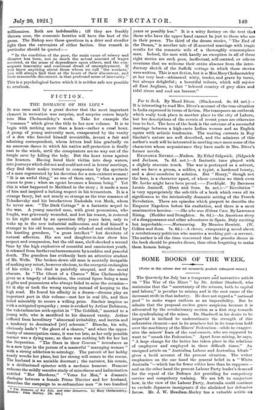FICTION.
THE ROMANCE OF HIS LIFE *
IT was once said by a great' doctor that the most important element in recreation was surprise, and surprise enters largely into Miss Cholmondeley's work. Take for example the " romance " which gives the title to her new volume. It is to begin with nothing more than a hoax—rather a cruel hoax. A group of young university men, exasperated by the vanity of a don who fancied himself irresistible, invent a fair and admiring correspondent, whose letters lead him gradually on an amorous dance in which his native self-protection is finally cast to the winds, until the conspirators see no way out of the tangle save by killing the lady. But the hoax turns against the hoaxers. Having lured their victim into deep waters, into journeys which did not and could not end in lovers' meetings, they find their malice turned to compassion by the spectacle of a man regenerated by his devotion for a non-existent woman ! "It is an awful thing," as one of them says, "when a poseur ceases to pose ; when an egoist becomes a human being." Yet this is what happened to Maitland in the story ; it made a man of him and inspired a lurking respect in his tormentors. It is a strange fancy, but not nearly so strange as the true romance of Tchaikovsky and his benefactress Nadeshda von Meek, whom he never saw. "The Dark Cottage" is a fantastic sequel to the wax. A young married man, with great possessions, who fought, was grievously wounded, and lost his reason, is restored to his right mind by an operation fifty years later, only to wake up in the new industrial millennium and find himself a stranger in his old home, mercilessly rebuked and criticized by his hustling grandson, "a great intellect" but destitute of natural affection. His son and daughter-in-law show him respect and compassion, but the old man, shell-shocked a second time by the high explosives of resentful and omniscient youth, is released from furtherembarrassments by a sudden and peaceful death. The grandson has evidently been an attentive student of Mr. Wells. The broken-down old man is mentally incapable of making any retort, however obvious, to the energetic onslaughts of his critic ; the duel is painfully unequal, and the moral obscure. In "The Ghost of a Chance" Miss Cholmondeley gives us a tragedy of indecision, the central figure being a man of gifts and possessions who always failed to seize the occasion— let it slip or took the wrong turning instead of keeping to the high road. He found his affinity in a dream—dreams play an important part in this volume—met her in real life, and then failed miserably to secure a willing prize. Sinclair inspires us with a mitigated sympathy ; none is evoked by Arthur Robinson, the valetudinarian arch-egotist in "The Goldfish," married to a young wife, who is sacrificed to his diseased vanity. Arthur suffered from hereditary "abnormal irritability, and inertia and a tendency to desalinated [sic] sclerosis." Blanche, his wife, obviously hadn't "the ghost of a chance," and when the oppor- tunity of emancipation came, it was too late, as her only possible rescuer was a dying man; so there was nothing left for her but the Serpentine. "The Stars in their Courses" introduces us to a new type in the person of a masterful "managing woman" with a strong addiction to astrology. The pursuit of her hobby nearly wrecks her plans, but her strong will comes to the rescue. The husband is an amiable doormat ; the narrator, his cousin, Is a disillusioned spinster with a sardonic humour. Humour redeems the mildly macabre study of miserliness and hallucination entitled "Her Murderer." "Votes for Men," a dramatic duologue between a female Prime Minister and her husband, describes the campaign to re-enfranchise men "in two hundred * The Romance of his Life. and other Romances. By Mary ChtdmondeleY• Loudon: John Murray. pe. net.]
years or possibly less." It is a witty fantasy on the text that those who have the upper hand cannot be just to those who are in their power. The third of the dream stories, "The End of the Dream," is another tale of ill-assorted marriage with tragic results for the romantic wife of a thoroughly commonplace man. Indeed, the men with hardly an exception in all of these eight stories are such poor, ineffectual, self-centred, or odious creatures that we welcome their entire absence from the intro- ductory sketch of the Suffolk cottage in which these stories were written. This is not fiction, but it is Miss Mary Cholmondeley at her very best—whimsical, witty, tender, and grave by turns, but always delightful ; a beautiful tribute, which will rejoice all East .anglians, to that "beloved country of grey skies and tidal rivers and cool sea breezes."


































 Previous page
Previous page